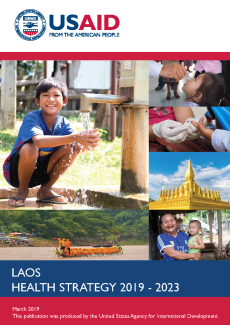Over the past two decades, Laos has significantly reduced poverty and hunger and improved health outcomes. USAID partners with Laos to reclaim and accelerate public health progress needed to reverse health systems weakened by COVID-19.
The COVID-19 pandemic, however, witnessed a sharp decline in the recorded utilization of essential and routine health services. To support Laos’ recovery from COVID-19 and strengthen a resilient health system, USAID works with the Government of Laos to improve the overall health system in a number of key areas. Assistance includes improving the health system’s capacities from the national to sub-national and community levels to ensure that the country has greater ability to steward, design, manage, and monitor a system of high-quality, integrated multi-sectoral approach reproductive, maternal, newborn, child, and adolescent health and nutrition services.
USAID provides vaccines and commodities and reinforces the health system for testing, vaccine administration, registration and cold chain management, while improving health information flow and coordination among the central, provincial, and district levels. USAID also fills critical gaps in building sustained and coordinated One Health capacities that incorporate linkages between human, animal, and environmental health.
USAID works closely with other development partners to strengthen the capacity of the host government, universities, research and academic institutions, the private sector, and civil society for the prevention, preparedness, detection, and response to infectious disease threats. Achieving and maintaining HIV epidemic control and the 2030 malaria elimination goal are key areas of USAID’s strategic support to Laos. In addition, USAID supports persons with disabilities to access quality health and rehabilitation services and income generation opportunities.
PROJECTS
Capacity Strengthening on Maternal Child Health and Nutrition Project (LMCHN): Strengthens the health sector’s capacity to plan, budget, manage, and deliver reproductive, maternal, newborn, child and adolescent health (RMNCAH) and nutrition services from the national down to the local health center levels. The project strengthens community engagement for improved RMNCAH and nutrition in 24 districts in 5 target provinces.
Community Maternal Child Health and Nutrition Strengthening in Lao PDR Project: Increases access to quality healthcare for rural communities by enhancing district health management and training health care workers. Assistance helps deliver equitable maternal and child health and nutrition services to vulnerable populations, while also improving community and household knowledge of positive health and nutrition care practices.
USAID Okard Project: Improves access to quality health and rehabilitation services, job opportunities for persons with disabilities, and the health and economic empowerment of persons with disabilities through greater community and stakeholder engagement.
COVID-19 Assistance: Strengthens nationwide COVID-19 detection, prevention, treatment, cold chain system and vaccination rollout through training and supervision, vaccination outreach campaigns, and digitization of vaccination records. Procures personal protective equipment, rapid antigen test kits, adverse events following immunization kits, life saving oxygen and cold chain equipment. To date, the United States has provided nearly 3 million doses of COVID-19 vaccines. Support has enabled schools and businesses to reopen safely, and strengthened the Government of Laos’ National Immunization Program and capacity to conduct testing and speed up the vaccination process.
Meeting Targets and Maintaining Epidemic Control (EpiC): A global project funded by PEPFAR (U.S. President’s Emergency Plan for AIDS Relief) through USAID, the project aims to achieve and maintain epidemic control in Laos among key populations through strategic technical assistance; capacity building; and implementation support to improve HIV prevention, case finding, care, and treatment programming through a client centered approach using the HIV Cascade Framework.
U.S. President’s Malaria Initiative (PMI): Supports the provision of targeted technical assistance to the national malaria program to improve data quality and reporting into its malaria surveillance system, while strengthening supply chain management systems to monitor and fill future commodity gaps. USAID/PMI supports the implementation of drug efficacy monitoring of first-line antimalarials, as well as evaluation of alternative treatment options. These efforts contribute towards Laos’ goal of malaria elimination by 2030.
Emergency Preparedness For Highly Pathogenic Avian Influenza (HPAI): Aims to minimize the risks of Avian Influenza disease incursion and spread. Specifically, interventions bridge critical gaps in disease prevention and control, such as improving veterinary services, investigating relevant poultry value chains, identifying critical control points along such chains, and improving the quality of epidemiological information.
Lao One Health University Network (LAOHUN): Partners with higher education institutions across the country to promote One Health awareness, knowledge, and practice to prevent, detect, and respond to infectious disease threats among humans, animals, and the environment. LAOHUN is committed to developing a diverse workforce whose technical skills span across many disciplines and sectors and has the competency to coordinate and collaborate across those stakeholders to manage infectious disease outbreaks.

